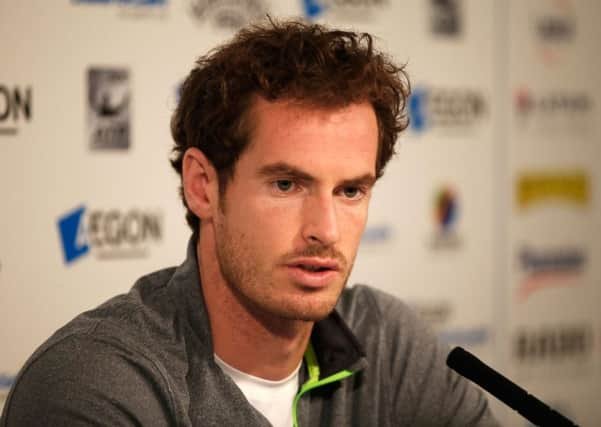Andy Murray calls for pay rise for struggling tennis pros


The Scot, along with his brother Jamie and Novak Djokovic, was elected by his peers to represent them: the players’ voice in the running of tennis. And while their concerns about prize money, scheduling and ranking points are not nearly as pressing as those of a post-Brexit Britain, the business of changing such policies is as complicated as unpicking European trade agreements.
Murray, though, is clear in what he wants to achieve. There is no messing with the world No 2.
Advertisement
Hide AdAdvertisement
Hide AdWimbledon has been enthralled by the fairytale of Marcus Willis and his journey to yesterday’s Centre Court appearance against Roger Federer. But only months ago, Willis was on the verge of packing it all in. He was 25, he was going nowhere in the sport and with a world ranking of 772, he had no chance of getting anywhere. And then he chatted to a girl in a bar, she told him to give it another shot and the rest is history.
As a result, Murray believes that the multi-millionaire elite players should be pushing the multi-million dollar sport to do more to help the Willises of this world.
“The first thing is you have to improve the prize money at the lowest level,” he said clearly and simply. “It’s been going up everywhere else, at the top of the game massively. But that hasn’t filtered down to the bottom of the game. That’s something that needs to change.
“I think it’s stayed the same since the 1980s. The cost of everything has gone up massively since then so it’s impossible to stay at that level for more than a couple of years. You are losing money unless you are winning each week. So for the guys that are stuck there for a couple of years, playing quarter-finals and semi-finals, you simply cannot fund your career that way.”
Murray and Djokovic are the last generation to make their big breakthrough as teenagers. Both were 19 when they cracked the world’s top 10 and Djokovic was 20 and Murray 21 when they broke in the top four. As Murray has been saying for years, players mature later these days simply because of the physical nature of the game. That means more time spent in poverty on the Futures and Challenger circuits.
“Someone like Marcus, if he had lost in the pre-qualifying at Wimbledon, we wouldn’t have this unbelievable story and he might not be coming back to play in January,” Murray said.
“There has to be more money at the bottom of the game. Some of the $10,000 tournaments, they have a 128 qualifying draw and it’s $30 to enter the qualifying. That’s a lot of money that doesn’t go to the players. The players at that level really need the money.”
It has been a dozen years since Murray had to worry about such things (by the end of his first year on tour, he was ranked No 64 and he was in the world top 20 eight months later) and with more than £35.5million banked in prize money alone and a cupboard stuffed with trophies, he has greater ambitions than simply balancing the books.
Advertisement
Hide AdAdvertisement
Hide AdHis immediate priority is plotting a path around Lu Yen-Hsun from Taipei today. They have met four times before (Murray leads their rivalry 3-1) and each time they have met on a grass court, Murray has won and gone on to win the title: Wimbledon 2013 and Queen’s club last summer.
But it is the one loss to Lu that sticks in Murray’s mind. It was the first round of the Beijing Olympics, it was Murray’s first Olympic experience and he was the favourite on the day. He lost in straight sets and he was devastated.
“I learnt that I was there to play tennis and not sort of just enjoy being part of the Olympics,” the now mature, experienced Murray said. “I turned up late because I had won Cincinnati. I did the opening ceremony and I was hanging out with a lot of the other athletes, stayed in the village. It was great, a great experience. But when I lost, I was gutted. I realised that my job at the Olympics is to try to win a medal for the country.”
He knows that his job today is to dispatch Lu as quickly and efficiently as possible. The man from Taipei is now 32 and not quite as nimble as he used to be and still on his way back from a six-month lay off with an elbow injury, he is not expecting miracles.
“I really respect him,” Lu said. “I know I can play freely because I have nothing to lose. He has the pressure. But he knows what he is going to do. We’ll see what I do.”
Murray knows what he is going to do for his fellow players, too, although that may have to wait for 10 days or so. The world No 2 has plans to be rather busy between now and the end of Wimbledon.